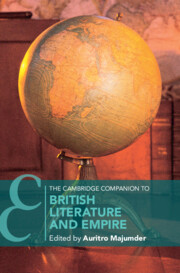Book contents
- The Cambridge Companion to British Literature and Empire
- The Cambridge Companion to British Literature and Empire
- Copyright page
- Contents
- Figures
- Contributors
- Acknowledgments
- Chronology
- Introduction
- Part I Early Intimations and Literary Genres: 1500–1800
- Part II Entanglements of Prose, Poetry, and Empire: 1800–1900
- Part III Figures, Movements, and Histories: 1900–1945
- Part IV Pathways and Legacies: 1945–2020
- Further Reading
- Index
- Cambridge Companions to Literature
- References
Introduction
Situating British Literature and Empire
Published online by Cambridge University Press: 20 November 2025
- The Cambridge Companion to British Literature and Empire
- The Cambridge Companion to British Literature and Empire
- Copyright page
- Contents
- Figures
- Contributors
- Acknowledgments
- Chronology
- Introduction
- Part I Early Intimations and Literary Genres: 1500–1800
- Part II Entanglements of Prose, Poetry, and Empire: 1800–1900
- Part III Figures, Movements, and Histories: 1900–1945
- Part IV Pathways and Legacies: 1945–2020
- Further Reading
- Index
- Cambridge Companions to Literature
- References
Summary
The chapter provides an overview situating the literatures produced or circulated in Britain and the racialized, classed, and gendered imaginaries of empire. English literature was informed by imperial concerns and anti-capitalist critique alike since the sixteenth century, even as England was a minor player among European imperial powers. Contemporary scholarship, while attending to marginalized authors, such as women, immigrants, minorities, and the working class, demonstrates that diverse literature, prose especially, but also drama and verse, were shaped by expanding trade, global markets, territorial appropriations, military conquests, human emigration, and cultural contact. A mix of ideologies spawned in the nineteenth century to rationalize British presence as not only inevitable but beneficial for the colonized; for colonized intellectuals, on the other hand, literature fostered alternative visions of resistance. Diasporic writers in twentieth-century Britain introduced readers to the vocabulary and memory of colonized lands. The chapter contends that many themes of contemporary culture are not unique to the present but variations of older, far-flung contests. Literature, in its ability to articulate shifts in perception, sensibilities, and relations before such changes are actualized, is an indispensable site of analysis and study.
Keywords
Information
- Type
- Chapter
- Information
- Publisher: Cambridge University PressPrint publication year: 2025
References
Works Cited
Accessibility standard: WCAG 2.0 A
Why this information is here
This section outlines the accessibility features of this content - including support for screen readers, full keyboard navigation and high-contrast display options. This may not be relevant for you.Accessibility Information
Content Navigation
Allows you to navigate directly to chapters, sections, or non‐text items through a linked table of contents, reducing the need for extensive scrolling.
Provides an interactive index, letting you go straight to where a term or subject appears in the text without manual searching.
Reading Order & Textual Equivalents
You will encounter all content (including footnotes, captions, etc.) in a clear, sequential flow, making it easier to follow with assistive tools like screen readers.
You get concise descriptions (for images, charts, or media clips), ensuring you do not miss crucial information when visual or audio elements are not accessible.
You get more than just short alt text: you have comprehensive text equivalents, transcripts, captions, or audio descriptions for substantial non‐text content, which is especially helpful for complex visuals or multimedia.
Structural and Technical Features
You gain clarity from ARIA (Accessible Rich Internet Applications) roles and attributes, as they help assistive technologies interpret how each part of the content functions.
